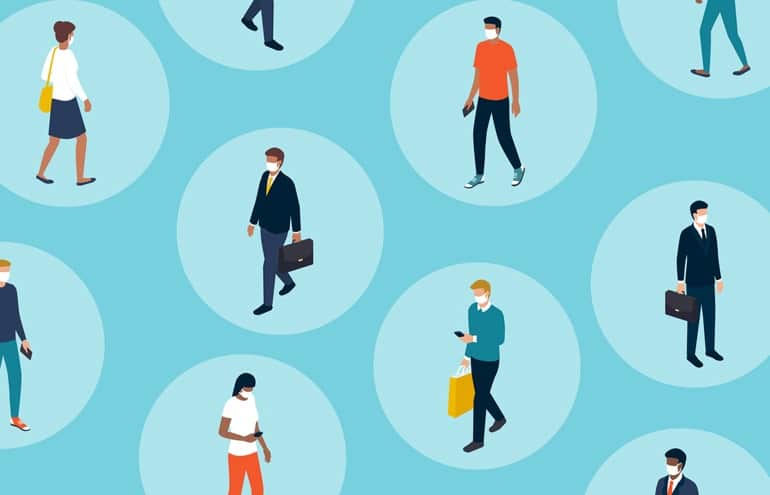Knowing these little things adding to your already high level of stress and anxiety will help you realize it’s not you, it’s the past year.

Table of contents
We’ve had to forgo some big things during the pandemic: traveling by air, being in the office with colleagues, going to concerts, weddings and parties, family reunions, court or depositions, and so on. We know the negative effects of missing out on big things. But there are a lot of smaller things we miss too, which adds to the stress and anxiety we’ve felt.
We may not even realize we’re missing these “little” things — certain moments, actions, give-and-takes or the like. Yet without understanding exactly why, we may feel apathetic or frustrated, even angry at their absence. Here are five such things — and the negative effect on your state of mind.
1. Social Interactions With People on the Periphery of Our Lives
We’ve missed so many social interactions in the past year: physical contact with our extended families, nights out with close friends, lunch with colleagues. Our efforts to stay connected virtually have focused almost entirely on our closest contacts. We Zoom with parents and grandparents, use Google Meet for cocktail hour with best friends, and sip coffee with a colleague over a morning call. But what about the other relationships we experience in normal times?
When we are free to go about our lives without masks or fear of getting sick, we have social contacts with lots of other people: the FedEx delivery person, the folks you see at the gym on the same day each week, colleagues near your office water-cooler, the other yogis in your yoga class, the staff at your bustling neighborhood cafe. Missing all the people you’d routinely or serendipitously meet adds to feelings of stress and anxiety.
Sometimes we hardly know these people. Nonetheless, they fill our lives with novelty and help us define ourselves in relation to our world. Without these interactions, we feel ungrounded.
2. The Ability to Fully Remember
Lately, I seem to forget to buy things I need and I often cannot recall the exact word I need. There’s a good reason for it — and it’s not aging! It turns out pandemic lockdowns can create a perfect storm for reduced memory function.
Memory is negatively affected by lack of novelty and physical activity and worsens as our social isolation increases. Stuck at home, going from bedroom to kitchen to home office (or dining room table) every day, our lives lack novelty. Bring on the cold weather and physical activity may also be limited. Remove our ability to socialize, and — boom — our memory struggles to function properly.
3. The Sounds of Social Interactions
During the warmer months, I realized that I wasn’t hearing the sounds of children playing outside in my neighborhood. Maybe a couple of siblings were playing together, but no groups of friends having fun on our street. All last summer, I never heard a neighbor having a party or the far-away murmurings of outdoor conversations. During the colder months, I’ve missed the sound of playdates and parties in my house. Music too loud. Laughter. Squeals of delight. It is isolating when no one comes inside to visit, and everyone in the house is on separate Zoom calls for class or work, wearing headphones in their own bubble, not interacting with others in their physical space.
4. Hugs and Handshakes
Human touch is fundamental to emotional well-being and a feeling of connection. When we’re unable to hug people we care about or shake hands with those we meet, we miss human connection. There is real science behind our need for touch. Human touch stimulates the vagus nerve, which is associated with motivation and feelings of reward and compassion. Physical touch also releases oxytocin, the happy hormone. Without hugs and handshakes, we may lack motivation and feel less happy.
5. A Good Night’s Sleep
Stress and anxiety caused by uncertainty this past year are negatively affecting sleep. The many changes caused by the pandemic may cause us to have trouble falling asleep, staying asleep, or going back to sleep in the middle of the night. For some people, the sheer number of things that need to be handled during a day may make the night too short. For example, if you handle home-schooling and manage a household on top of a law practice, you may be up late each night and getting up early every morning. It’s tough to get a good night’s sleep.
It may help to know you are not alone in these experiences and feelings of stress and anxiety. While there may not be an easy fix, just knowing the feelings are normal reactions to the little things we are missing is a step in the right direction.
More From Attorney at Work:
- “Handling Fear and Stress During a Prolonged Crisis” by Shawn Healy
- “Five Ways to Reduce Anxiety in a Worldwide Pan(dem)ic” by Jamie Spannhake
- “Start Sleeping Better Tonight: 3 Tips for a More Restful Night” (on our sister site Health Food Radar)
Have You Read Jamie Spannhake’s Bestselling Book?
 Find Your Calm in the Chaos
Find Your Calm in the Chaos
In “The Lawyer, the Lion, and the Laundry: Three Hours to Finding Your Calm in the Chaos,” lawyer and certified health coach Jamie Spannhake helps you learn how to CHOOSE, ACT and THINK in ways that will clarify your desires and set priorities so you can reclaim your time and enjoy your life.
Available in the Attorney at Work bookstore, here.
















